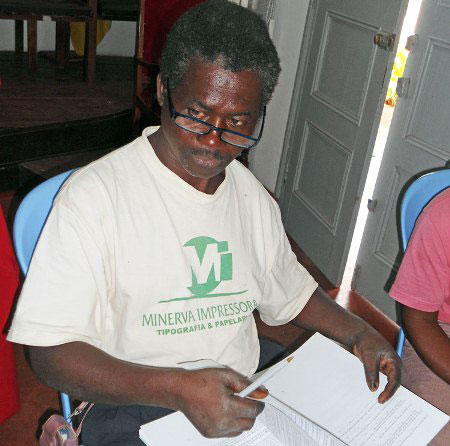The Health Policy Project ended in 2016. Work continued under Health Policy Plus (HP+) until 2022.
NEWS & VIEWS
Gender Equality Training Results in Positive Changes for a Pastor and his Congregation in Mozambique
Posted March 7, 2013
 |
Pastor Timoteo Bedane participates in an HIV prevention session. Photo by Christian Council of Mozambique. |
Last year, 50-year-old pastor Timoteo Bedane had a revelation. Like many other religious leaders around the world, Pastor Bedane had preached – and practiced – male dominance in marriage. These traditional values typically consider men as the sole decisionmakers in the relationship, whether it is controlling household finances or choosing to visit a doctor when women or children fall ill.
Throughout the world, gender inequalities not only hamper women’s ability to participate in social and economic development, they can inhibit women from seeking services that maintain their health and prevent HIV. At its worst, this inequity is manifest through violence. Females who experience gender-based violence are three times more likely to become infected with HIV than those who have not, fueling the epidemic among women.
In 2012, the Christian Council of Mozambique (CCM) began facilitating HIV prevention discussion sessions at Pastor Bedane´s church in the province of Sofala. CCM is one of more than fifty leading Mozambican civil society organizations participating in the Capable Partners Program (CAP) in Mozambique, supported by the U.S. President´s Emergency Plan for AIDS Relief (PEPFAR) through USAID. CAP provides grants and intensive training in organizational development, project design, and implementation to expand these community organizations’ critical role in Mozambique’s HIV response. Since last year, the Health Policy Project (HPP) has been working with CAP to integrate gender issues into the training materials, helping community organizations address gender-related factors in their HIV prevention programs and reduce gender-based violence.
Working through churches, CCM educational sessions focus on discussing abstinence, fidelity, and gender issues, and how they all relate to HIV. Yet, CCM’s messages often challenge the beliefs and practices of the organization’s target populations, who continue to espouse traditional roles of controlling husbands and subservient wives.
Initially, Pastor Bedane had reservations about the roundtable sessions. He and his wife participated to set an example for the congregation, but the Pastor did not appreciate the discussions about equality in marriage. “I thought at the time that the people from CCM were just bringing me and my church problems,” recalls Pastor Bedane.
As the Pastor continued to participate in the sessions, his viewpoint began to evolve. “Over time I saw that these messages were the same as teachings from the Bible,” said Pastor Bedane.
Pastor Bedane began helping his wife with housework, engaging her in decisions about the family´s finances, and fostering more open and respectful communication in their marriage. In doing so, he noticed considerable improvement in his marriage and began to preach about his experience, encouraging others to adopt this approach.
However, the Pastor’s actions and words were met with concern and hostility from many of his friends, family, and congregation. Undeterred, Pastor Bedane invited his most vocal critics – three couples from his congregation – to participate in the CCM sessions. Since then, these couples have become avid supporters of equality in marriage and have actively recruited others to take part in the sessions.
“In my church today, couples now walk hand in hand, embrace each other, and even kiss,” reports Pastor Bedane. “These things did not happen before CCM came to our church.”
Back to International Women's Day 2013 home page
Learn more about Health Policy Project activities in Mozambique
What's New
- Something to Build On: “Innovation Exchange” Celebrates the Health Policy Project’s Close and a New Beginning
- What Will it Take for Tanzania to Achieve ART Targets and Ensure Long-Term Sustainability of the HIV Response?
- Helping Kenya’s County Leaders Advocate for Increased Health Investments
- HPP Holds Working Meeting on Ensuring Responsible PEPFAR Transitions for Key Populations
- Health Policy Project Celebrates 2016 International Women's Day
- HPP Staff Participate in White House Conference on HIV Stigma Reduction

